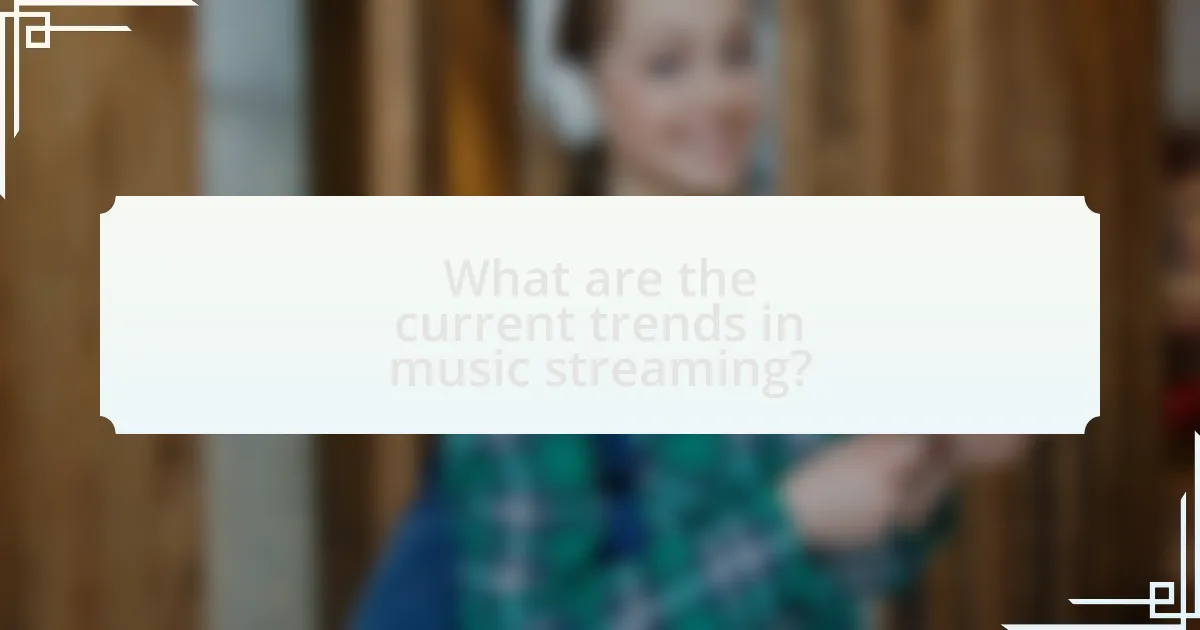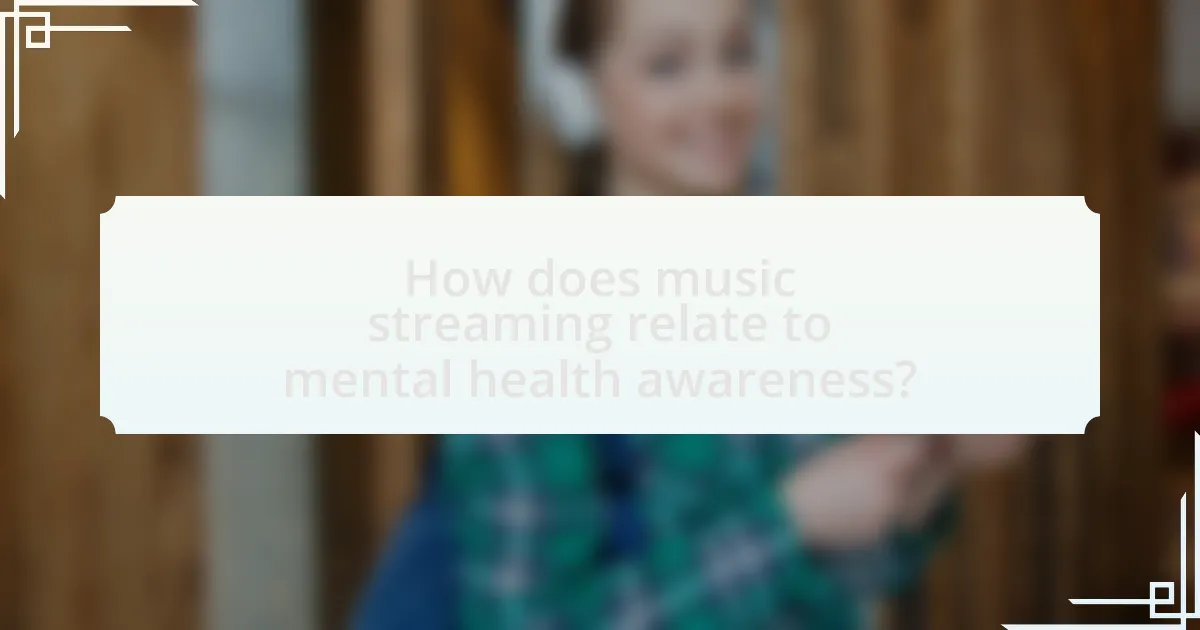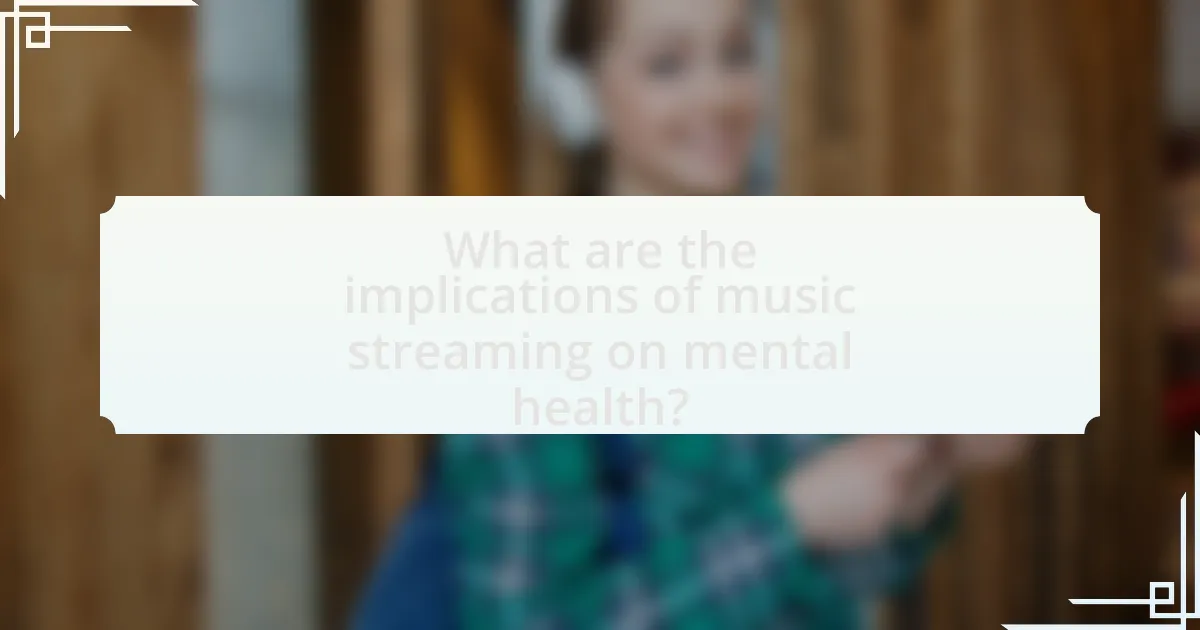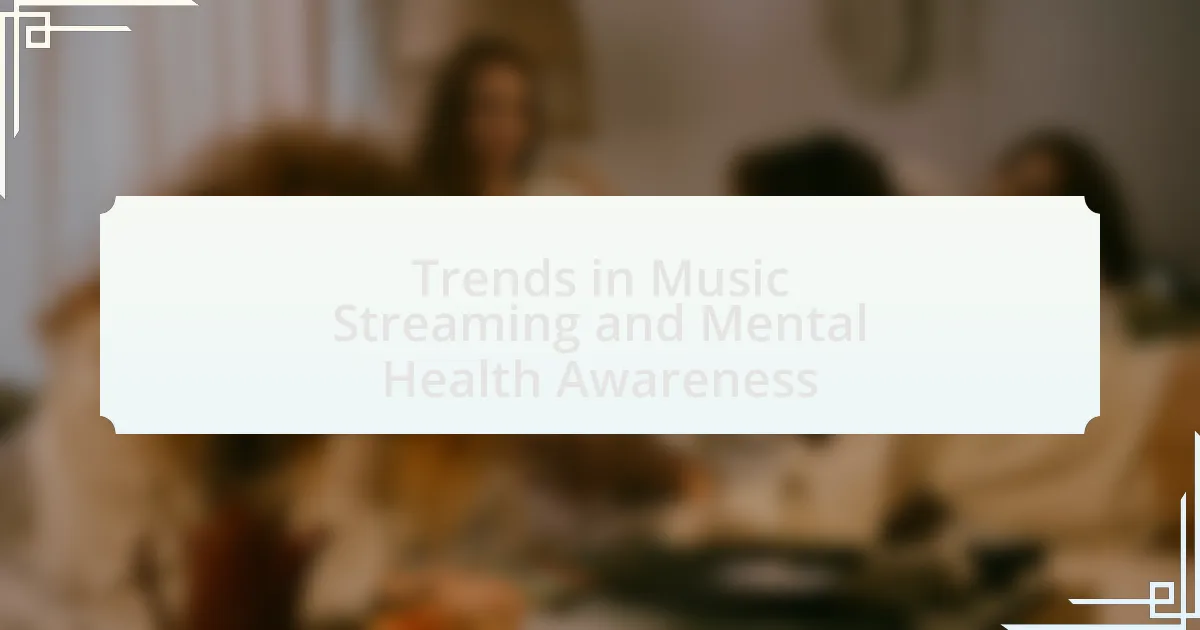The article examines current trends in music streaming and their relationship with mental health awareness. It highlights the rise of personalized playlists, social media integration, and the use of music as a tool for emotional support, with 70% of users seeking streaming services for mental health benefits. The impact of streaming platforms on the music industry is discussed, emphasizing the shift to digital subscriptions and the democratization of music distribution for independent artists. Additionally, the article explores how technology, algorithms, and curated playlists influence music discovery and mental wellness, while also addressing the potential negative effects of excessive streaming on mental health.

What are the current trends in music streaming?
Current trends in music streaming include the rise of personalized playlists, increased integration of social media features, and a growing focus on mental health awareness through music. Personalized playlists, driven by algorithms, enhance user experience by curating content based on listening habits, which has been shown to increase user engagement. Social media integration allows users to share music easily, fostering community and interaction around music consumption. Additionally, platforms are increasingly promoting music as a tool for mental health, with playlists designed to alleviate stress and anxiety, reflecting a broader societal recognition of the connection between music and emotional well-being. According to a report by the International Federation of the Phonographic Industry (IFPI), 70% of users engage with music streaming services for emotional support, highlighting the significance of these trends.
How has the rise of music streaming platforms changed the music industry?
The rise of music streaming platforms has fundamentally transformed the music industry by shifting revenue models from physical sales to digital subscriptions and ad-supported streams. This transition has led to a significant increase in music accessibility, allowing consumers to access vast libraries of music for a monthly fee or for free with advertisements. According to the Recording Industry Association of America (RIAA), streaming accounted for 83% of the U.S. music industry’s revenue in 2020, highlighting the dominance of this model over traditional sales. Additionally, streaming platforms have democratized music distribution, enabling independent artists to reach global audiences without the need for major label support, as evidenced by the success of artists like Chance the Rapper and Billie Eilish, who gained prominence through platforms like SoundCloud and Spotify.
What are the most popular music streaming services today?
The most popular music streaming services today are Spotify, Apple Music, Amazon Music, and YouTube Music. Spotify leads the market with over 500 million active users as of 2023, offering a vast library and personalized playlists. Apple Music follows with approximately 88 million subscribers, providing exclusive content and integration with Apple devices. Amazon Music has around 100 million users, benefiting from its integration with Amazon Prime. YouTube Music, with over 80 million subscribers, leverages its extensive video library to attract users. These services dominate the streaming landscape due to their user-friendly interfaces, extensive music catalogs, and innovative features.
How do subscription models impact artist revenue?
Subscription models significantly impact artist revenue by providing a more stable and predictable income stream compared to traditional sales. Artists receive a portion of the subscription fees paid by users, which can lead to higher overall earnings as streaming platforms grow their user bases. For instance, in 2020, the Recording Industry Association of America reported that streaming accounted for 83% of the music industry’s revenue, with subscription services being a major contributor. This shift allows artists to earn money based on the number of streams rather than relying solely on album sales, which have declined in recent years. Consequently, subscription models can enhance financial sustainability for artists, particularly independent ones, by offering consistent revenue regardless of fluctuating sales.
What role does technology play in music streaming trends?
Technology is a crucial driver of music streaming trends, enabling seamless access to vast libraries of music and personalized listening experiences. Streaming platforms utilize algorithms and data analytics to recommend songs based on user preferences, which enhances user engagement and retention. For instance, Spotify’s algorithm analyzes over 30 million tracks and billions of user interactions to curate personalized playlists, significantly influencing listening habits. Additionally, advancements in mobile technology and internet connectivity have facilitated the rise of on-demand streaming, allowing users to listen to music anytime and anywhere, which has reshaped consumption patterns in the music industry.
How do algorithms influence music discovery for listeners?
Algorithms significantly influence music discovery for listeners by personalizing recommendations based on user behavior and preferences. Streaming platforms like Spotify and Apple Music utilize complex algorithms that analyze listening history, song ratings, and user interactions to curate playlists and suggest new tracks. For instance, Spotify’s Discover Weekly playlist is generated using collaborative filtering and natural language processing, which considers millions of user data points to identify patterns and preferences. This targeted approach not only enhances user engagement but also exposes listeners to a broader range of music, including emerging artists and genres they may not have encountered otherwise.
What advancements in technology are shaping the future of music streaming?
Advancements in technology shaping the future of music streaming include artificial intelligence, high-resolution audio formats, and blockchain technology. Artificial intelligence enhances personalized recommendations and curates playlists based on user behavior, significantly improving user engagement; for instance, Spotify’s algorithm analyzes over 30 million tracks to tailor suggestions. High-resolution audio formats, such as FLAC and MQA, provide superior sound quality, appealing to audiophiles and driving subscription growth in services like Tidal. Blockchain technology offers transparent royalty distribution, ensuring artists receive fair compensation, as demonstrated by platforms like Audius, which utilize decentralized networks to streamline payments. These technological innovations are transforming the music streaming landscape, enhancing user experience and artist revenue.

How does music streaming relate to mental health awareness?
Music streaming significantly enhances mental health awareness by providing accessible platforms for artists to share messages about mental health and for listeners to find solace in music that resonates with their experiences. Streaming services often curate playlists focused on mental health themes, such as anxiety relief or emotional healing, which can help individuals feel understood and supported. Research indicates that music can reduce stress and improve mood, with a study published in the Journal of Positive Psychology showing that listening to music can lead to a 21% increase in positive emotions. This accessibility and focus on mental health topics in music streaming contribute to a broader cultural conversation about mental health, encouraging individuals to seek help and fostering community support.
What is the connection between music and mental health?
Music has a significant connection to mental health, as it can influence emotions, reduce stress, and improve overall well-being. Research indicates that listening to music can activate brain regions associated with pleasure and reward, leading to the release of dopamine, a neurotransmitter linked to feelings of happiness. A study published in the Journal of Positive Psychology found that participants who engaged with music reported lower levels of anxiety and depression. Additionally, music therapy has been shown to be effective in treating various mental health conditions, including PTSD and anxiety disorders, by providing emotional expression and facilitating communication.
How can music streaming be used as a tool for mental wellness?
Music streaming can be used as a tool for mental wellness by providing easy access to a wide variety of music that can enhance mood, reduce stress, and promote relaxation. Research indicates that listening to music can trigger the release of dopamine, a neurotransmitter associated with pleasure and reward, which can improve overall emotional well-being. Additionally, curated playlists designed for specific moods or activities, such as meditation or exercise, can help individuals manage anxiety and depression. A study published in the Journal of Music Therapy found that music interventions significantly reduced symptoms of depression in participants, demonstrating the therapeutic potential of music streaming platforms in supporting mental health.
What genres of music are most beneficial for mental health?
Genres of music that are most beneficial for mental health include classical, jazz, and ambient music. Research indicates that classical music can reduce anxiety and improve mood, as demonstrated in a study published in the Journal of Advanced Nursing, which found that listening to classical music significantly lowered stress levels in participants. Jazz music has been shown to enhance creativity and emotional expression, contributing positively to mental well-being. Additionally, ambient music is often used in therapeutic settings to promote relaxation and mindfulness, supporting mental health by reducing symptoms of depression and anxiety.
How are streaming platforms promoting mental health awareness?
Streaming platforms are promoting mental health awareness by featuring content that addresses mental health issues and collaborating with mental health organizations. For example, platforms like Spotify have created playlists and podcasts focused on mental well-being, such as “Your Daily Wellness” and “The Happiness Lab,” which provide listeners with resources and discussions around mental health topics. Additionally, these platforms often partner with mental health campaigns, such as Mental Health Awareness Month, to raise awareness through curated content and social media initiatives, effectively reaching millions of users and encouraging open conversations about mental health.
What initiatives have music streaming services launched to support mental health?
Music streaming services have launched several initiatives to support mental health, including curated playlists, partnerships with mental health organizations, and features promoting mental wellness. For instance, Spotify introduced a “Wellness Hub” that offers playlists designed to improve mood and reduce anxiety. Additionally, Apple Music has collaborated with mental health advocates to create playlists that focus on themes of healing and self-care. These initiatives are backed by research indicating that music can significantly impact emotional well-being, with studies showing that listening to music can reduce stress and improve mood.
How do playlists curated for mental health impact listeners?
Playlists curated for mental health positively impact listeners by providing emotional support and promoting well-being. Research indicates that music can influence mood and reduce anxiety; for instance, a study published in the Journal of Music Therapy found that participants who listened to music specifically designed for relaxation experienced significant decreases in stress levels. Additionally, curated playlists often include songs that resonate with listeners’ emotional experiences, fostering a sense of connection and understanding. This tailored approach can enhance listeners’ coping mechanisms and overall mental health, as evidenced by surveys showing that individuals who engage with mental health-focused playlists report feeling more understood and less isolated.

What are the implications of music streaming on mental health?
Music streaming has significant implications on mental health, both positive and negative. On the positive side, access to a vast array of music can enhance mood, reduce stress, and provide emotional support, as studies indicate that listening to music can trigger the release of dopamine, a neurotransmitter associated with pleasure and reward. Conversely, excessive music streaming may lead to feelings of isolation or addiction, as individuals may substitute real-life interactions with virtual experiences, potentially exacerbating anxiety and depression. Research published in the Journal of Music Therapy highlights that while music can be therapeutic, over-reliance on streaming platforms can diminish face-to-face social connections, which are crucial for mental well-being.
How does excessive music streaming affect mental well-being?
Excessive music streaming can negatively impact mental well-being by contributing to feelings of isolation and anxiety. Research indicates that individuals who engage in high levels of music streaming may experience a decrease in face-to-face social interactions, which are crucial for emotional support and mental health. A study published in the journal “Psychology of Popular Media” found that excessive use of streaming services correlates with increased feelings of loneliness and depression among users. Furthermore, constant exposure to certain music genres can influence mood and emotional states, potentially exacerbating existing mental health issues.
What are the signs of music streaming addiction?
Signs of music streaming addiction include excessive listening, neglecting responsibilities, and experiencing withdrawal symptoms when unable to access music. Individuals may spend several hours daily on streaming platforms, prioritizing music over social interactions and daily tasks. Research indicates that compulsive music consumption can lead to negative impacts on mental health, such as increased anxiety and depression, as users may rely on music for emotional regulation. Additionally, a study published in the Journal of Behavioral Addictions found that individuals who reported high levels of music streaming engagement often exhibited signs of addiction similar to those seen in other behavioral addictions.
How can listeners maintain a healthy relationship with music streaming?
Listeners can maintain a healthy relationship with music streaming by setting boundaries on their listening habits. Establishing specific times for music consumption can prevent excessive use, which has been linked to negative mental health outcomes, such as anxiety and depression. Research indicates that overexposure to music can lead to emotional fatigue, highlighting the importance of moderation. Additionally, diversifying music genres and incorporating live music experiences can enhance enjoyment and reduce reliance on streaming platforms, fostering a more balanced approach to music consumption.
What best practices can enhance the positive effects of music streaming on mental health?
To enhance the positive effects of music streaming on mental health, individuals should curate personalized playlists that align with their emotional states and preferences. Research indicates that listening to music that resonates with one’s feelings can significantly improve mood and reduce anxiety. For instance, a study published in the Journal of Positive Psychology found that participants who engaged with music tailored to their emotional needs reported a 20% increase in overall well-being. Additionally, setting aside dedicated time for music listening, free from distractions, can further amplify its therapeutic benefits, as focused listening allows for deeper emotional processing and relaxation.
How can individuals create personalized playlists for mental health benefits?
Individuals can create personalized playlists for mental health benefits by selecting songs that evoke positive emotions, promote relaxation, or enhance focus. Research indicates that music can significantly influence mood and mental well-being; for instance, a study published in the Journal of Positive Psychology found that participants who listened to uplifting music reported improved mood and reduced anxiety levels. To create an effective playlist, individuals should consider their emotional responses to different genres and artists, curate tracks that resonate with their personal experiences, and regularly update the playlist to reflect their evolving mental health needs.
What resources are available for those seeking help with music-related mental health issues?
Resources available for those seeking help with music-related mental health issues include specialized organizations, online platforms, and community support groups. Organizations such as the Music Industry Mental Health Fund provide financial assistance for mental health services specifically for music professionals. Online platforms like Headspace and Calm offer guided meditations and mindfulness exercises tailored for musicians. Additionally, community support groups, such as the Musician’s Assistance Program, provide peer support and counseling services. These resources are designed to address the unique mental health challenges faced by individuals in the music industry, emphasizing the importance of mental well-being in a high-pressure environment.

Leave a Reply